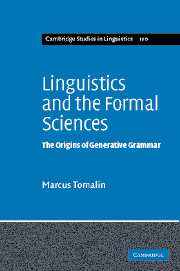6 - Conclusion
Published online by Cambridge University Press: 22 September 2009
Summary
As indicated in the introduction, and as demonstrated in the subsequent chapters, this book manifestly constitutes an exercise in historiography, and the general purpose has been to reveal the nature and extent of the influence of the formal sciences upon the development of linguistic theory in the twentieth century, with the main emphasis falling upon the advent of TGG. At this stage, therefore, it is probably worth summarising the main issues considered, in order to review the central conclusions of the various intertwined investigations presented in the foregoing chapters.
One of the main tasks attempted in several sections of this book has been the re-evaluation of certain aspects of Bloomfield's work in the light of his interest in the foundations crisis and (specifically) in Formalism, aspects which appear to anticipate some of the preoccupations that obsessed mathematically minded linguists in the 1950s. In particular, it was suggested that Bloomfield's wellknown mistrust of semantic considerations in the study of natural languages may have been influenced by his knowledge of Hilbertian proof-theoretical techniques which (at least in their popularised form) recommend the avoidance of semantic considerations in (meta)mathematical proofs in favour of noncontentual syntactic manipulations. In general, recent research has neglected Bloomfield's knowledge of the foundational debates of the 1920s and 1930s, as well as his professional interest in the relationship between linguistics and mathematics.
- Type
- Chapter
- Information
- Linguistics and the Formal SciencesThe Origins of Generative Grammar, pp. 183 - 200Publisher: Cambridge University PressPrint publication year: 2006

